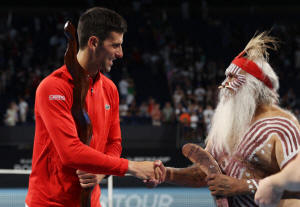Djokovic, Jabeur join other top players on first PTPA executive
committee
 Send a link to a friend
Send a link to a friend
 [January 11, 2023]
By Shrivathsa Sridhar and Amy Tennery [January 11, 2023]
By Shrivathsa Sridhar and Amy Tennery
MELBOURNE/NEW YORK (Reuters) - Novak Djokovic, Tunisian world number
two Ons Jabeur and six other top players will form the first
executive committee of the Professional Tennis Players Association (PTPA)
as it fights for a seat at the table with the sport's governing
organisations.
The committee, set to be announced ahead of next week's Australian
Open, also includes co-founder Vasek Pospisil, Polish world No. 11
Hubert Hurkacz, Americans John Isner and Bethanie Mattek-Sands,
Spaniard Paula Badosa and China's Zheng Saisai.
It is a critical step forward for the players' body which has
divided the tennis world - putting powerhouse Djokovic opposite the
sport's old guard - as it accelerates plans to create a "true seat"
at the negotiating table.
"There's every indicator out there now that this will be a huge
moment for our sport," Canadian Pospisil told Reuters.
"Every player that we have on there is so respected, very well
liked, intelligent... They'll be huge assets and we're very lucky
that they've joined."
It is more than two years since Serbia's Djokovic and Pospisil sent
shockwaves through tennis when they stepped down from the ATP player
council and announced the breakaway group.

The ATP, which runs the men's tour, and several players bristled at
the move and the sport's governing bodies have yet to publicly
embrace the idea.
Djokovic said the PTPA could co-exist with the ATP, which was set up
by players in 1972 but now has a board including equal
representation for tournament owners.
"Ultimately, I could see why they would want to keep the status
quo," said Pospisil. "(But) I think it's only fair and right that
players have their association just as, you know, most other sports
do."
INDEPENDENT CONTRACTORS
Player associations are nothing new in professional sports. But
unlike the National Football League and National Basketball
Association, where players participate in labour unions, tennis
players operate as independent contractors.
Djokovic told reporters last week in Adelaide that he hoped more
players would recognise the potential of the PTPA, adding "this
association needs to live."
[to top of second column] |

Serbia's Novak Djokovic shakes hands with Ngarrindjeri elder Major "Moogy"
Sumner during the trophy presentation after winning the Adelaide
International against Sebastian Korda of the U.S. REUTERS/Loren
Elliott

Executive Director Ahmad Nassar said one key challenge has been
getting across to people what the PTPA is.
"It's an advocacy group on behalf of tennis players. Okay, cool
story. But then what? What does that mean?" he told Reuters. "I
think we have to answer that."
That answer is a set of guiding principles, which are expected to be
revealed on Wednesday, that include topics ranging from player
welfare to their right to organise.
The simmering tension between the PTPA and the sport's old guard
comes amid a brutal rift in golf, where the Saudi-backed breakaway
LIV Tour lured top talent from the long-standing PGA Tour, prompting
a legal battle and war of words.
Nassar added that while the PTPA had no interest in setting up a "LIV
Tour of tennis" itself, it would be willing to discuss any proposals
that would increase players' income if approached.
"We'd engage with anybody who was interested in making sure the
players were compensated more fairly, and more players are able to
make a living playing the sport they love."
The Executive Committee comes together at a pivotal time for the
PTPA, which in August launched its for-profit arm.
Nassar said an annual budget of $5-10 million was needed to do the
work for athletes spread around the world, although it has no
immediate plans to charge dues.
"It's important for us, you know, even $50 or $100 (dues) to not
have that to start to really demonstrate, 'Hey, we exist to benefit
the group of professional tennis players, men and women', and to
show that, prove it," he said.
"And then, you know, if it makes sense at some later point to be
able to charge dues, maybe we do that."
(Reporting by Amy Tennery in New York and Shrivathsa Sridhar;
Editing by Ken Ferris)
[© 2023 Thomson Reuters. All rights
reserved.]
This material may not be published,
broadcast, rewritten or redistributed.
Thompson Reuters is solely responsible for this content.
 |